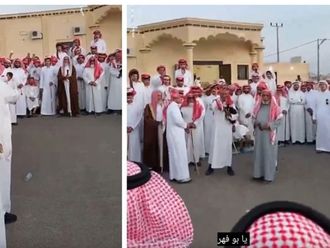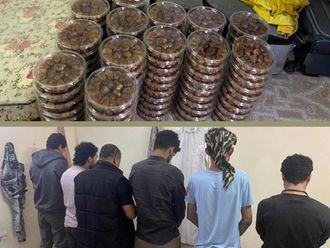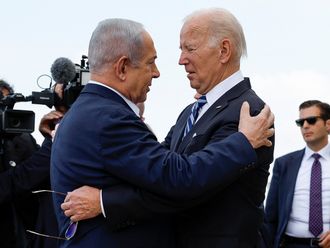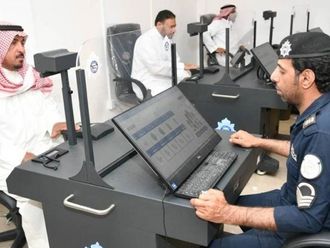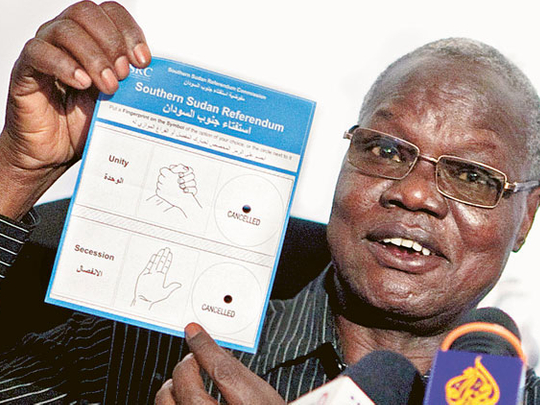
Juba: Separation or unity. A solitary hand or two clasped together.
That's the choice — and the ballot image — for close to 4 million registered voters in Southern Sudan beginning tomorrow, when a seven-day referendum on separation from Africa's biggest country begins.
The vote, which is likely to lead to the world's newest nation, is the culmination of a 2005 peace deal that ended a North-South civil war that lasted two decades and killed 2 million people.
Organising the vote in the impoverished land, where many are herders and nomadic at least part of the year and where only 15 per cent of people can read and write, was an enormous challenge. Only 2 per cent of southerners complete primary school.
Almost 4 million voters were registered over the last several months, including 116,000 southerners who live in Sudan's North and 60,000 in eight other countries, including the US.
To be on the safe side, more ballots were printed than the number of registered voters. More than 7.3 million ballots were sent to Southern Sudan for distribution to more than 2,600 polling sites, in places ranging from the slowly up-and-coming southern capital of Juba to remote cattle herder hamlets of a few huts. Anyone who has a parent or ancestor from a southern tribe can vote, as can anyone whose parents or grandparents have been in the South since January 1, 1956.
Southerners will be using a ballot that is much simpler than the long list of names and symbols they were confronted with during national elections in April. This time, the ballot shows two images: one of a lone hand that represents independence and the other image depicting two clasped hands, along with the words "Secession" and "Unity."
The South's ruling party has worked to educate the population on what each symbol means so there will be no confusion at the ballot box. Top officials have even taken to greeting one another with a high five _ to show two separate hands _ instead of a handshake.
The European Union will have 104 observers and experts. The Carter Centre — founded by former US President Jimmy Carter — is deploying more than 100 observers. Carter himself, along with former UN Secretary-General Kofi Annan and US Senator John Kerry and actor George Clooney, a Sudan activist, will be present for the referendum. China, which has large investments in Sudan's oil sector, is also sending observers.
Southern Sudan, with an estimated 8.7 million people, has very little infrastructure outside Juba. It is among the world's poorest, least healthy and least educated countries. The UN says a typical 15-year-old girl has a higher chance of dying in childbirth than finishing school. Aid groups say southerners streaming home from the North are creating dire shortages of basic services.
"We have an unfolding humanitarian crisis layered on top of an existing and forsaken one," said Susan Purdin of the International Rescue Committee.
After the polls close on January 15, counting will begin at local polling stations as local and international observers watch. Results will be posted at each polling site, giving the world an early look at piecemeal results. The ballots will then be sent to Juba and verified using a double blind data entry system.
Summary of results
Southerners are expected to vote overwhelmingly for secession. There were concerns that the central government in Khartoum could manipulate the votes from the North, but only 160,000 voters are registered there so any meddling with those results would likely be too insignificant to affect the outcome. The referendum needs 50 per cent plus one vote to pass, along with a 60 per cent turnout of registered voters. A summary of the results will be posted on a website. Final results aren't expected to be verified until the end of January. It is likely the vote's outcome will be known well before then, however.
"There is an overwhelming consensus that the South will vote to secede. The question is what happens the day after the vote," said Marina Ottaway of the Carnegie Endowment for International Peace.
The North and South still need to negotiate the distribution of oil revenues, rights to the White Nile, official borders and citizenship rights. If the South votes to secede, full independence won't take place before July 9, when the 2005 Comprehensive Peace Agreement, or CPA, expires and a new agreement must take its place, said Ottaway.
Violence could still flare along border hotspots and in the region of Abyei, which had also been scheduled to hold a freedom referendum on Sunday but no longer is. Instead, it is likely to be subject to continued negotiations between the North and South, brokered alternately by the African Union and the US.






